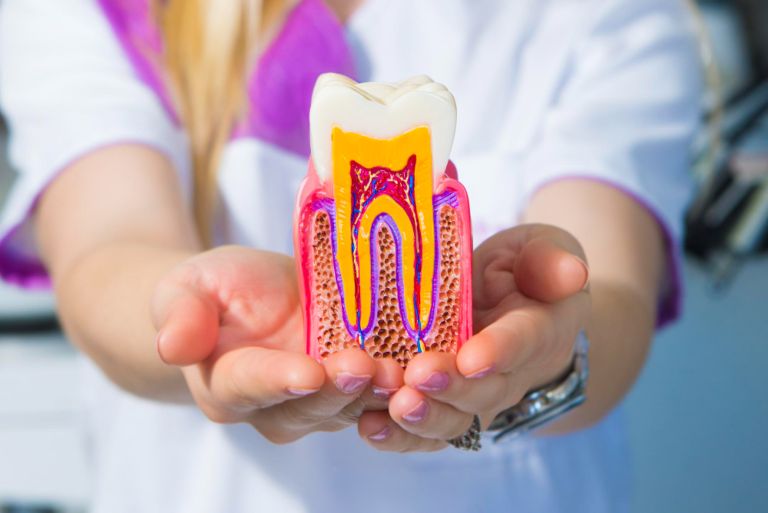If your tooth gets significantly damaged, or infected, or even if tooth decay has started, a dentist may discuss a couple of treatment plans. The most common treatment is root canal therapy, but the dentist will also likely recommend a dental implant after tooth extraction.
Root canal therapy is the procedure of removing the soft part of the tooth, the pulp when it becomes damaged or infected. The pulp is made out of nerves, connective tissue, and blood vessels that feed the tooth and help it grow. Removing the pulp makes the tooth “dead”, but this is the best way to preserve the structure of a tooth after the pulp has been damaged or infected.
If your tooth is damaged to the point that even a root canal can’t help it, an extraction paired with a dental implant is needed. Dental implants are artificial teeth that are put in place of teeth that fall out or get extracted due to significant damage. The two types of dental implants are endosteal (in the bone) and subperiosteal (on the bone). Endosteal implants are more common, and they usually resemble small screws that are surgically inserted deep into the jawbone. One implant can be used to anchor multiple teeth.

The main benefit of opting for root canal therapy is that you get to keep your original tooth, and you can expect to maintain a natural smile. A crown that sits on top of your tooth may be needed to fix significant decay, but you will keep most of your original tooth structure.
Root canal therapy is much less invasive than dental extraction and implants, even though it may not seem like it. Local anesthesia is used when performing a root canal, which makes it essentially painless. With surgical extraction and inserting dental implants, intravenous and local anesthesia is needed, and your dentist has to cut into your gums to remove the tooth.
Root canal therapy is significantly cheaper than dental extraction and implants. You can also get insurance coverage on your root canal, but dental implants may not be covered by your insurance because of the cost. According to CostHelper, the estimated cost of a root canal with insurance coverage ranges between $250 and $1,600. Meanwhile, a tooth extraction and implant can easily go between $4,000 and $10,500, depending on the specifics of your situation.
It can take several months for a tooth extraction to heal, but you may need to wait even longer before your bone has healed for a dental implant. Meanwhile, recovery from a root canal typically lasts just a few days.

Root canal treatment can have some risks, depending on the amount of damage to your tooth and your tooth structure.
If you have fragile teeth, your teeth may chip when the dentist drills down into your tooth to remove the infected pulp. If the root canal is done on one of the back teeth, a crown is recommended to protect the tooth from the strong forces when biting.
Your tooth can’t be ensured to last after a root canal if it is damaged enough, and you might lose it anyway. A root canal may not be enough and you may need a tooth extraction and implant.
If you lack good dental insurance and are in need of a root canal and crown, the expenses may rise and the cost could be at an unaffordable level. Keep in mind that if you don’t have insurance, a root canal will cost significantly more.
Your dentist will choose what option is going to be best for you in the long term. The choice will depend on your budget and dental situation. If you prefer keeping your own tooth or just don't have enough damage to suffice for a dental implant, the dentist will recommend a root canal, otherwise if budget isn't your concern you can opt for a dental implant.

